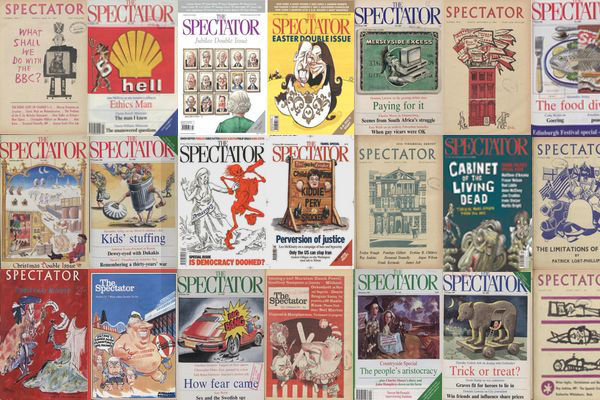Soldiering on
Sir: Max Hastings’s article about demobbed army officers trying for a job after the war struck a chord (‘Demob unhappy’, 16 May). The problem prevailed. I left as a captain many years later in 1978. The local vicar asked what I was going to do with myself, adding scornfully, ‘Go into commerce, I suppose. Well, even that might be a struggle for someone who knows little else other than to play cowboys and shoot Indians!’
Somewhat bemused, I asked where his Sunday collections came from if — either directly or indirectly — it wasn’t commerce. He wasn’t pleased with this. Luckily, a few months later I was hired by a British company to do some fascinating work in north Africa. I often wondered if they did so largely out of curiosity.
Greg Waggett
Clare, Suffolk
Sir: Max Hastings doesn’t mention the indecent haste with which wounded servicemen were discharged. My late father had been wounded and captured at Arnhem. Back in the UK, he asked to be given a few months to recover from his wounds and try to relaunch what had been a promising career at the Chancery Bar. He was told his patriotic duty was to resign his commission and stop being a drain on the national resources.
Robert Davies
London SE3
Death duties
Sir: Mark Mason (‘Dead expensive’, 16 May) is dead right to highlight the funeral rip-off, but he misses a minor exaction and a major opportunity. Useful savings can be made by avoiding churches: a priest who may never have met the deceased isn’t cheap, and a church is liable to involve expensive add-ons such as choirs. The opportunity is to do something worthwhile with the money saved.
The option of a natural burial in an attractive landscape is a good alternative to the horrors of a municipal cemetery or crematorium. My personal choice, less impressive but perhaps more useful, is to leave my cadaver to medical science: the human anatomy departments of teaching hospitals are delighted to receive one.
After the fun, there’s charity. May I recommend a generous donation to the Gurkha Welfare Trust? What should have been a year of celebration of 200 years of service in the British army has turned into national tragedy.
Sandy Skinner
Winchcombe, Glos
Creative discussion
Sir: I usually have no quarrel with Stephen Bayley, an astute and witty critic, but I do think he’s a bit hard on artists (Books, 16 May). I have read neither of the collections he excoriates, but the genre of artist interview remains — at least for me — a prime source of information and interest.
I get the feeling that Bayley prefers a TV-style badgering, an interview technique akin to John Freeman’s notorious Face to Face confrontations. But do we really want to see Gilbert Harding cry? I’d much rather discover that Frank Auerbach watches Morse or that Richard Deacon enjoys dancing. Oh, and something about the dark mysteries of the creative process would be good too — but that, I suspect, depends on which artists you choose to talk to. In the end, it’s all in the selection.
Andrew Lambirth
Washbrook, Suffolk
In praise of the pit bull
Sir: I wholeheartedly endorse Mary Wakefield’s article on the pit bull (9 May). I have rescued Staffies over many years, and my present devoted friend Chester came to me with the obligatory studded collar, the name Tyson and a cruel history. After a few weeks of TLC he was transformed into a loving, loyal companion adored by all who know him. Like the pit bull, the Staffie is unfairly and much maligned, primarily due to ignorant and aggressive owners.
Andrew Ashenden
Cambridge
Moores respect, please
Sir: Roger Alton deplores the use by the England cricketers of the familiar ‘Mooresie’ for their (former) coach, Peter Moores, and feels this may be symptomatic of the problems that infest English cricket (Spectator sport, 16 May).
How different it was in my youth. In 1958 I was fortunate enough to attend, together with a group of other boys, cricket classes at Hampshire’s county ground. During a break, a boy was heard to refer to the Hampshire professional Ray Pitman as ‘Pitman’. He was summoned to the secretary’s office and given a dressing down by Desmond Eagar for his presumption. Such exemplary standards notwithstanding, England (in the guise of MCC) still lost 4-0 in their tour of Australia later that year.
Tom Blackett
West Byfleet, Surrey
Illegitimate point
Sir: Simon Callow writes that Orson Welles joins Stewart Menzies of MI6 and the historian John Wheeler-Bennett in a group of rumoured bastard sons of Edward VII (Arts, 9 May). Unlike the other two gentlemen, however, Welles suffered from the distinct disadvantage that the Playboy Prince was no longer alive when he was conceived.
Tony Percy
Southport, North Carolina
The first Sturgeon
Sir: In case any of your readers missed this report: The Spectator, 18 August 1838: ‘On Wednesday, the first Sturgeon caught in the Thames in the present season was conveyed by John Nelson, the Assistant Water Bailiff, to the Lord Mayor. It is usual to send the first Sturgeon of the Mayoralty to the Sovereign; but the Lord Mayor having taken a view of the fish, observed that it was too small and meagre to set before her Majesty.’
Peter Wellby
Chiddingly, East Sussex
Got something to add? Join the discussion and comment below.
Get 10 issues for just $10
Subscribe to The Spectator Australia today for the next 10 magazine issues, plus full online access, for just $10.
You might disagree with half of it, but you’ll enjoy reading all of it. Try your first month for free, then just $2 a week for the remainder of your first year.













Comments
Don't miss out
Join the conversation with other Spectator Australia readers. Subscribe to leave a comment.
SUBSCRIBEAlready a subscriber? Log in